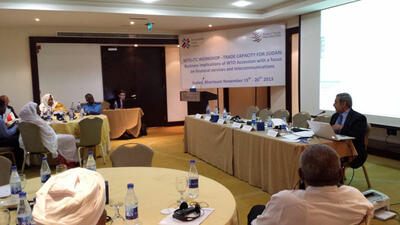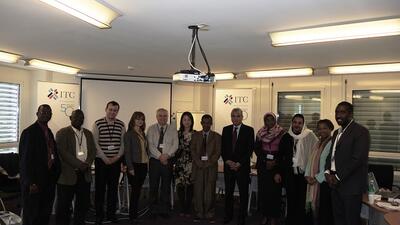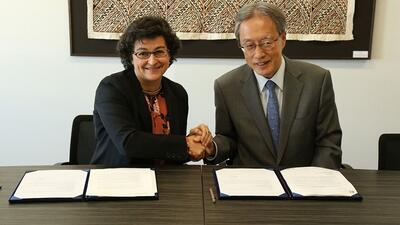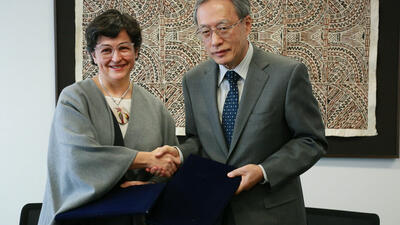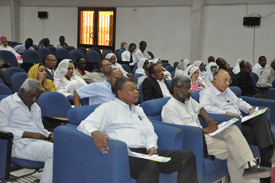
Sudán piensa relanzar las pláticas de acceso a la OMC (en)
Government officials and business leaders at ITC-supported conference in Khartoum call for Sudan’s WTO accession to be brought back on track.
Sudan’s pending accession process to the World Trade Organization (WTO) must be reactivated’. That was the unequivocal message from members of Sudan’s Government, business leaders and academics at a recent stakeholder conference on Sudan’s WTO Accession negotiations in Khartoum. Since 2004, Sudan’s accession negotiations have been stalled.
More than 60 participants took part in the conference, held on 16-17 April, and organized at the initiative of the Sudan National Secretariat of WTO Affairs and hosted by the Sudanese Businessmen and Employers Federation. Stakeholders at the event endorsed a set of 10 recommendations that are meant to guide government and businesses in identifying the priorities and to next steps needed to re-launch the negotiations.
Supported by ITC, as part of the ITC-WTO programme Building Technical Capacity for WTO Acceding LDC’s, the conference sought to raise awareness among the participants about the broader benefits and challenges of WTO membership and the possible business implications of membership. Through the conference, the government wanted to obtain guidance about the priorities and the next steps needed to move ahead with the WTO accession negotiations.
Opening the conference, Mrs Ishraqa Mahmoud, Sudan’s Minister for International Cooperation, emphasized the importance of Sudan joining the WTO. ‘Sudan’s WTO accession is an important step to gain secure market access, and help our businesses to integrate with the world economy,’ she said. The audience, too, expressed its agreement with the need for WTO membership as it would be in the best interest for the development of the country.
While WTO membership could certainly benefit Sudan’s non-oil exporters — such as live meat products, sesame seeds, Arabic gum and cotton — to raise competitiveness, some participants nevertheless voiced their concerns. ‘Although WTO agreements will allow Sudan to still protect domestic producers, Sudanese businesses are worried that they cannot compete against imported products’, said Mr Gindeel Ibrahim, Chairman of the Sudanese Businessmen and Employers Federation. The high costs of trading, for example, was singled out as a particular source of worry, because of the high import tariffs. Sudan has an average import-tariff rate of 20.2%, which is considerably higher than most countries in Africa and the Middle East. Other locally and nationally imposed taxes, charges and fees — especially on the movement of livestock moving and on major export crops — add to the costs.
A recurring issue raised by both public and private sector representatives was the need for domestic reforms of government policies and to address severe supply-side constraints for production and trading. One business representative said: ‘Through WTO membership, businesses could benefit from more uniform policies at home, experiencing less confusion as a result of binding commitments and principles of predictability and transparency of Government policies.’
A representative of the Sudanese Business Women Association urged Sudan’s Government to ‘utilize the opportunity provided by WTO accession negotiations to put the house in order’, to make business hampered by high cost of production able to compete. This call was backed by ITC representatives who pointed out that, if the WTO accession talks come in tandem with domestic reforms, this would help ensure more predictability for business and increase transparency for Sudanese companies.
While there appears to be firm national support behind Sudan’s bid for WTO accession, participants at the conference acknowledged that that there is still much work to be done. ‘Sudan needs to take the necessary steps towards the goal of completing its WTO accession negotiations, including towards fulfilling its technical and legal obligations, using our strong technical capabilities, and with assistance from international partners, like ITC,” said Mrs Mahmoud.
Mr Mohamed Bashir Abdul Rahman, the acting Secretary-General of the National Secretariat for WTO Affairs, said that Sudan would submit updated documents to the WTO Secretariat and the member states, that reflect changes since the separation of South Sudan, which took effect last year. He said that the documents would include a legislative action plan, and a revised version of the Memorandum of the Foreign Trade Regime (currently up for review by ministries).
As a result of the conference, the National Secretariat for WTO Affairs, in collaboration with stakeholders from the public and the private sector, agreed on a set of 10 recommendations, that identify the priorities and the next steps that should be taken in order to re-launch the WTO accession process and bring Sudan’s trading partners back to the negotiation table.
On coordination, for example, a recommendation was made to set up a ‘National Ministerial Committee to supervise and provide the financial and technical resources needed by the National Secretariat for WTO Affairs’, which would enable it to perform its coordinating role more effectively. In addition, some private sector representatives — including the Union of Industries and Sudanese Business Women Association — argued for a broader, institutionalized public-private dialogue.
On technical assistance, the recommendations stress the need for awareness-raising activities and impact studies in order to determine and better understand the implications of WTO accession on the various sectors.
Despite several years of non-activity in Sudan’s WTO accession negotiations, the private sector displayed strong and pro-active participation during the event, with businesses expressing theire interest in learning more about the implications of WTO membership and to support the government in this effort.
Under pressure to scale up and diversify Sudan’s non-oil export sectors, business and other stakeholders demanded the government to better strategize, prioritize and coordinate implementation of domestic reforms, in line with WTO accession negotiations. At home, increasing collaborative efforts with business and civil society will be crucial for Sudan’s Government in its bid to forge stakeholder confidence for domestic reforms and WTO commitments. At the same time, the Sudanese Government officials present at the conference expressed strong commitment to lead the process. They acknowledged, though, that strong coordination and political support at home, and assistance of international partners, is crucial to re-launch Sudan’s WTO accession negotiations.
For further information, please contact Rajesh Aggarwal, Chief, Business and Trade Policy, or Famke Schaap, Consultant, Business and Trade Policy.
Additional information can also be found at the Sudan National Secretariat for WTO Accession and the Sudanese Businessmen and Employers Federation.





